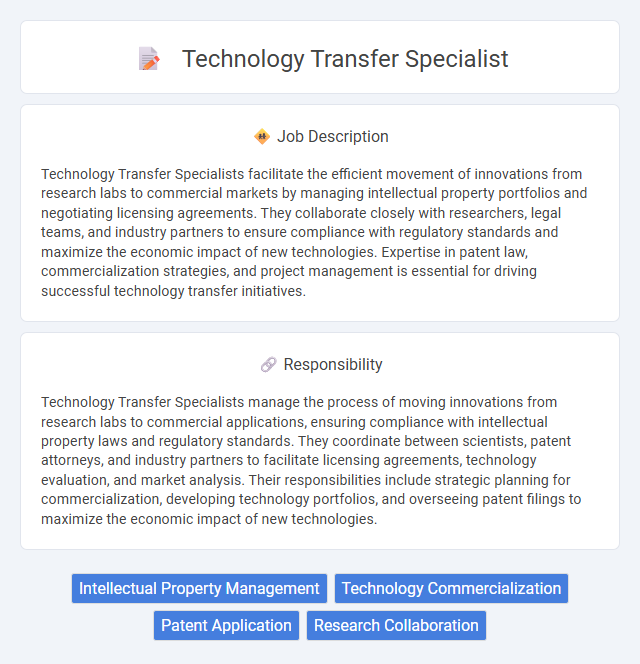
Technology Transfer Specialists facilitate the efficient movement of innovations from research labs to commercial markets by managing intellectual property portfolios and negotiating licensing agreements. They collaborate closely with researchers, legal teams, and industry partners to ensure compliance with regulatory standards and maximize the economic impact of new technologies. Expertise in patent law, commercialization strategies, and project management is essential for driving successful technology transfer initiatives.
Individuals with strong communication skills and a background in science or engineering are likely suitable for a Technology Transfer Specialist role. Candidates who enjoy bridging the gap between research and commercialization may find this job fulfilling. Those who struggle with collaborating across diverse teams or explaining complex technical concepts might face challenges in this position.
Qualification
Technology Transfer Specialist positions typically require a bachelor's degree in engineering, biotechnology, or a related scientific field, with many employers preferring a master's degree for advanced roles. Relevant experience in project management, intellectual property, regulatory compliance, and the commercialization process is essential for successful technology transfer. Strong communication skills and familiarity with contract negotiation, licensing agreements, and cross-functional collaboration further qualify candidates for these roles.
Responsibility
Technology Transfer Specialists manage the process of moving innovations from research labs to commercial applications, ensuring compliance with intellectual property laws and regulatory standards. They coordinate between scientists, patent attorneys, and industry partners to facilitate licensing agreements, technology evaluation, and market analysis. Their responsibilities include strategic planning for commercialization, developing technology portfolios, and overseeing patent filings to maximize the economic impact of new technologies.
Benefit
Technology Transfer Specialists likely facilitate the smooth movement of innovations from research labs to commercial markets, increasing the probability of successful product development. Their expertise in intellectual property and licensing agreements may enhance the chance of securing profitable partnerships and funding. This role could significantly benefit organizations by accelerating innovation adoption and generating revenue through effective technology commercialization.
Challenge
The role of a Technology Transfer Specialist likely involves navigating complex regulatory environments and bridging gaps between research innovations and commercial applications. Challenges may arise from coordinating multidisciplinary teams and managing intellectual property rights while ensuring compliance with legal frameworks. Successfully addressing these obstacles is probable to require strong communication skills and strategic problem-solving abilities.
Career Advancement
Technology Transfer Specialists facilitate the commercialization of innovations by bridging research institutions and industry partners, enhancing intellectual property management and licensing strategies. Mastering regulatory compliance, patent law, and market analysis accelerates career progression into senior roles like Technology Transfer Manager or Director of Innovation. Expertise in negotiation and cross-functional collaboration proves essential for advancing leadership opportunities within tech commercialization and corporate development sectors.
Key Terms
Intellectual Property Management
A Technology Transfer Specialist in Intellectual Property Management coordinates the protection and commercialization of innovations developed within research institutions. They evaluate patent portfolios, draft licensing agreements, and collaborate with inventors to secure intellectual property rights while facilitating partnerships with industry stakeholders. Proficiency in patent law, negotiation skills, and knowledge of technology commercialization processes are essential for successfully managing intellectual property assets and maximizing revenue potential.
Technology Commercialization
Technology Transfer Specialists facilitate the commercialization of innovative technologies by managing intellectual property, negotiating licensing agreements, and fostering partnerships between research institutions and industry. Their role includes evaluating market potential, guiding startups through technology adoption, and ensuring compliance with regulatory frameworks. Expertise in patent law, market analysis, and strategic business development is essential to accelerate the transfer of academic inventions into viable commercial products.
Patent Application
A Technology Transfer Specialist plays a crucial role in managing patent applications by identifying and protecting intellectual property generated through research and development activities. They collaborate with inventors to prepare, file, and monitor patent applications, ensuring compliance with legal standards and maximizing the commercial potential of innovations. Expertise in patent law, technology commercialization, and negotiation skills is essential for effectively facilitating technology licensing and fostering industry partnerships.
Research Collaboration
A Technology Transfer Specialist facilitates research collaboration by bridging the gap between academic institutions and industry partners to accelerate innovation commercialization. They manage intellectual property agreements, negotiate licensing deals, and coordinate joint research projects to ensure effective knowledge exchange. Expertise in patent law, market analysis, and strategic partnership development is essential for optimizing collaborative outcomes and driving technology adoption.
 kuljobs.com
kuljobs.com